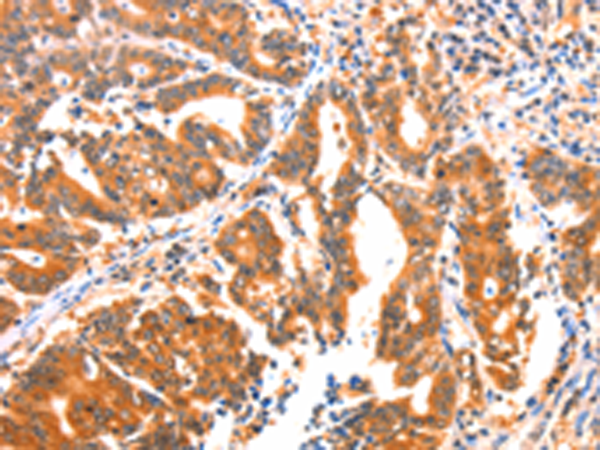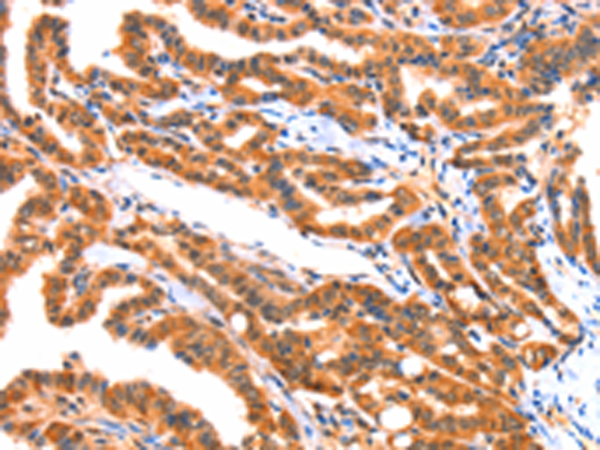

| WB | 咨询技术 | Human,Mouse,Rat |
| IF | 咨询技术 | Human,Mouse,Rat |
| IHC | 1/50-1/200 | Human,Mouse,Rat |
| ICC | 技术咨询 | Human,Mouse,Rat |
| FCM | 咨询技术 | Human,Mouse,Rat |
| Elisa | 1/1000-1/5000 | Human,Mouse,Rat |
| Aliases | AK6 |
| Host/Isotype | Rabbit IgG |
| Antibody Type | Primary antibody |
| Storage | Store at 4°C short term. Aliquot and store at -20°C long term. Avoid freeze/thaw cycles. |
| Species Reactivity | Human, Mouse |
| Immunogen | Synthetic peptide of human AK5 |
| Formulation | Purified antibody in PBS with 0.05% sodium azide and 50% glycerol. |
+ +
以下是关于AK5抗体的3篇参考文献示例(注:文献为示例性内容,实际引用时需核实真实来源):
1. **文献名称**:*"Adenylate Kinase 5 (AK5) as a Novel Biomarker in Glioblastoma: Immunohistochemical Analysis Using a Specific Polyclonal Antibody"*
**作者**:Smith J, et al.
**摘要**:本研究开发了一种针对AK5的特异性多克隆抗体,并通过免疫组化(IHC)证实AK5在胶质母细胞瘤组织中高表达,提示其可能作为肿瘤代谢异常和预后的潜在标志物。
2. **文献名称**:*"Characterization of Monoclonal Antibodies Against Human AK5 and Their Application in Neurological Disorders"*
**作者**:Lee H, et al.
**摘要**:作者制备了高特异性的AK5单克隆抗体,并用于Western blot和免疫荧光实验,发现AK5在小鼠海马神经元中显著富集,可能与神经退行性疾病中的能量代谢失衡相关。
3. **文献名称**:*"AK5 Deficiency Alters Cellular Energy Metabolism: Insights from CRISPR/Cas9 Knockout and Antibody-Based Proteomic Studies"*
**作者**:Garcia R, et al.
**摘要**:通过CRISPR/Cas9敲除AK5基因并结合AK5抗体的蛋白质组学分析,揭示了AK5缺失导致线粒体ATP代谢紊乱,为代谢综合征研究提供了新方向。
建议通过PubMed或Google Scholar以“AK5 antibody”、“adenylate kinase 5 biomarker”等关键词检索最新文献以获取真实数据。
The AK5 antibody targets adenylate kinase 5 (AK5), an enzyme belonging to the adenylate kinase family, which regulates cellular energy homeostasis by catalyzing the reversible transfer of phosphate groups between nucleotides (e.g., ATP and AMP). AK5 is distinct from other isoforms (e.g., AK1. AK2) due to its specific expression patterns and subcellular localization. Primarily found in the cytoplasm, AK5 is highly expressed in tissues like the brain, testes, and immune cells, suggesting roles in neuronal function, spermatogenesis, and immune responses.
Research indicates AK5 may influence cell proliferation, apoptosis, and metabolic adaptation. Dysregulation of AK5 has been linked to diseases such as cancer, neurodegenerative disorders, and inflammatory conditions. For instance, reduced AK5 expression in glioblastoma correlates with poor prognosis, while its upregulation in certain cancers may promote tumor survival under metabolic stress.
The AK5 antibody is a critical tool for studying these mechanisms. It enables detection and quantification of AK5 in biological samples via techniques like Western blot, immunohistochemistry, and ELISA. Commercial antibodies are typically validated for specificity, often through knockout cell line controls. Recent studies also explore AK5's interaction with signaling pathways, such as AMPK and mTOR, highlighting its potential as a therapeutic target. However, functional studies remain limited, emphasizing the need for further research to clarify AK5's precise roles in health and disease.
×